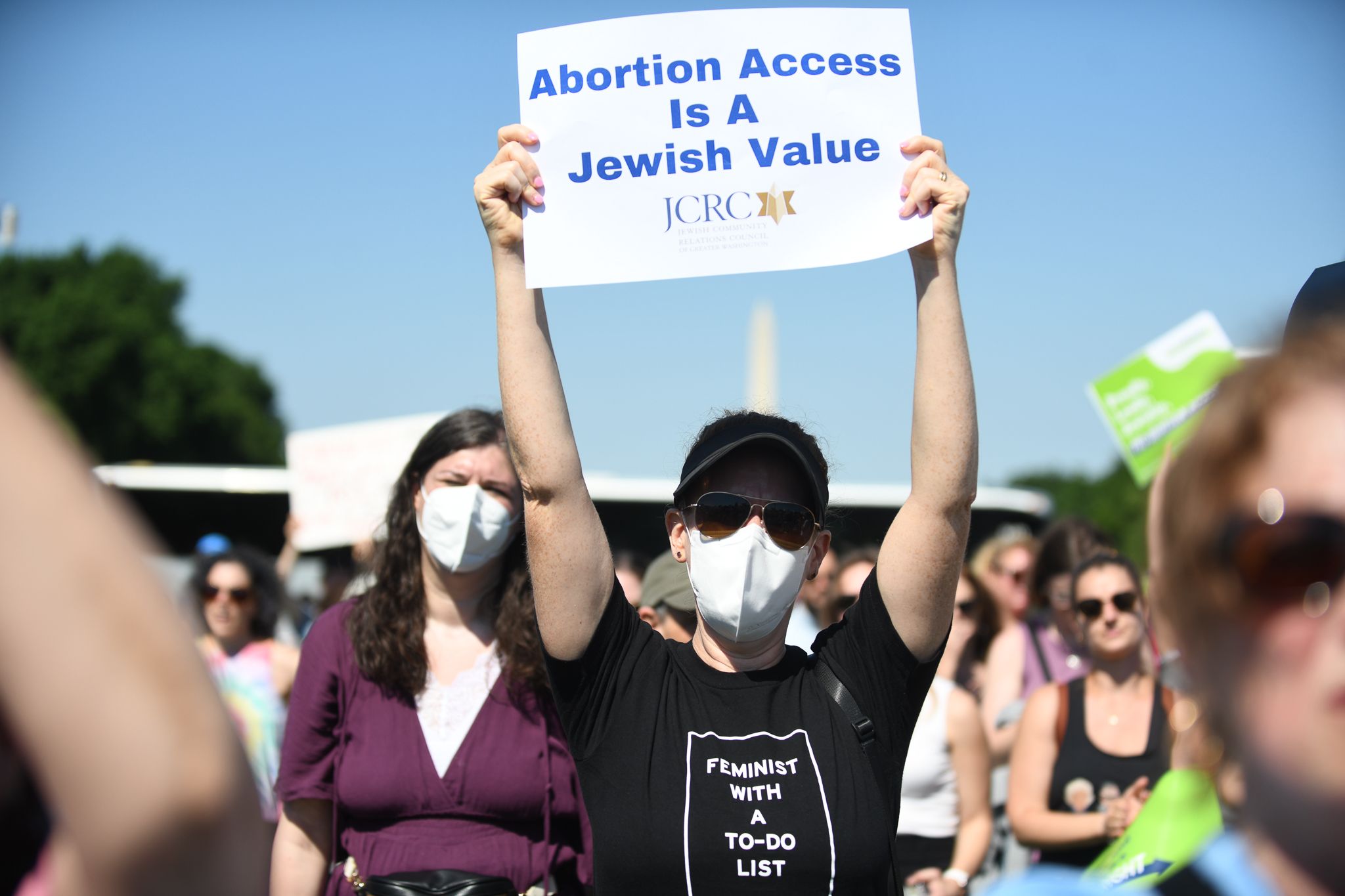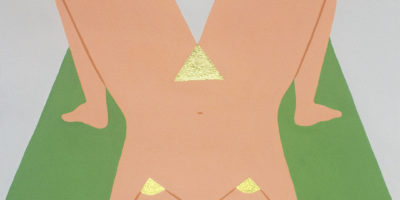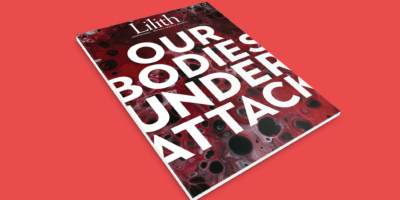
Rallying for Abortion, Jewishly
In May 2022, Jews and allies from around the country traveled to D.C. to join NCJW and others for The Jewish Rally for Abortion Justice.
In the wake of the June decision by SCOTUS to deny women the reproductive rights guaranteed for the past 50 years, here are some edited and updated excerpts of speeches from that rally.
STEPH BLACK
feminist activist in D.C.
I am a queer, Jewish, practical support volunteer and you can join me.
I’ve driven abortion seekers from all over the country to abortion clinics in D.C., some of whom have traveled with their children to get care.
As a volunteer, I’ve seen firsthand that it is never straightforward to access an abortion, especially for those already struggling to make ends meet—it is a maze of racism, classism, and misogyny. Finding childcare, getting time off of work, arranging travel to a different state, and finding the funds to cover an expensive procedure would be almost impossible if it weren’t for abortion funds, practical support collectives, and other volunteers who work to make abor- tion access a practical reality.
It is no longer enough to be the retically “pro-choice” if those choices are impossible to access. We must all be unequivocally pro-abortion and break down the systemic barriers to access.
If this is the first time you’ve showed up, Lo dayenu. It is not enough just to march, if you are not also clinic escorting or driving patients.
If the only time you are using your voice is at the ballot box, Lo dayenu. You need to be having these conversations with your loved ones, with that uncle you don’t want to talk to on Thanksgiving, with your colleagues and your classmates who make microaggressions.
If the only money you are donating is to have your logo on a website for an event like today, or to a national advo- cacy organization but not an independent clinic or an abortion fund, Lo dayenu. It is time for all of us to show up together to make abortion access a practical reality. Now is the moment to donate to local abortion funds, to volunteer, and to show up for abortion access.
I’ll see you out there.
RABBA SARA HURWITZ
first Orthodox woman publicly ordained
As an Orthodox female rabbi, I understand the impulse to use halakha [Jewish law] as a foil to hold back women—and by women I mean humans. Our tradition is one of compassion. Orthodox Judaism’s view of abortion does not align with the Catholic church or the Christian right of today. The halakhic system shows tremendous compassion for the circumstances of the mother, the family and the viability and health of the fetus.
The theoretical cases in our tradition take on new meaning when a woman, in tears, is sitting in front of me telling her story. Maybe it’s a story about forced pregnancy while in an abusive relation- ship; or a mother who has struggled to get pregnant for years, and now has a fetus with a severe medical condition. Perhaps it’s a woman with a physical or mental disorder. Although we shouldn’t need any justification for an abortion, I want to say that in each of these cases, Jewish law leads with compassion.
It is no coincidence that the Hebrew word for womb is rechem, which forms the root of the word rachamim or compassion, conveying that when it comes to wombs, when it comes to the decision to choose to build or not build a family we need to operate from a place of understanding and of compassion. God has rachamim. Jewish tradition has rachamim. Let us too, lead with rachamim, with compassion.
RABBI HARA PERSON
of the Central Conference of American Rabbis
I stand here 100 years after my great-grandmother Lena had two knitting needle abortions on her kitchen table. She turned to the best of bad options because she could barely feed the children she had. My great-grandmother was one of the lucky ones. She lived to tell the tale. When abortion became legal in this country, she made sure her family knew her story.
I am here to say proudly that Reform rabbis and the Reform movement believe that abortion access is essential healthcare, a basic human right, and a Jewish value. Jewish belief prioritizes an actual life over a potential life…
In memory of my great-grandmother, Lena, I will keep fighting for our rights to control our bodies and our lives.
REVEREND CHERISSE SCOTT
founder of SisterReach Tennessee
I accepted this invitation to speak with you, our Jewish community members, because I believe that the Jewish community’s religious beliefs play an important role in our movement’s future. It is also important that this community of believers stand with BIpoC communities to call out white nationalist terrorism and systemic oppression. But not just because of its historical impact on communities of color, but because of the historical impact it has had on you.
With this invitation is a request that you adopt the reproductive justice fram work to be used as a Jewish value and movement-building principle. It makes a case for human rights for all people and for all Jews, including Black Jews to live in abundance. …
We are all more than aware that right-wing Christian nationalists are not concerned with the unborn or the living. The white nationalist terrorist attack in Buffalo tells us everything we need to know about the priorities of the Christian right—as they are still silent. …This is why it is imperative that we work together to recenter our own humanity and that of the people we serve to experience the human right to a quality of life that is sustainable, something to aspire to, and look forward to.
HEATHER BOOTH
underground abortion pioneer and organizer
In 1965, years before Roe, I started an underground abortion service called Jane. Before Roe, the women in Jane themselves performed over 11,000 abortions. We made it safe, but it was not legal. We must make abortion safe, accessible and legal.
The extreme right-wing is dismantling our freedom for abortion, freedom to vote, freedom to have a country where everyone is treated with dignity and respect. This is a battle between freedom and tyranny.
This is a battle to make history.
Jews know about making history. We know about the struggle for freedom. We have been fighting Pharaohs for generations. And we know that when we organize, we can defeat tyranny.
RABBI ANNIE LEWIS
Jewish leader in Philadelphia
Like one out of every four people who can become pregnant, I too have had an abortion. Thank God I had access to supportive reproductive healthcare and loving community. So should it be for everyone who needs an abortion…. A story is told in the Talmud about a person who is sick, who says, “I need to eat on Yom Kippur.” It’s the holiest day, a day of fasting, and her doctor says she should be able to fast. Our rabbis say, “We listen to the patient. She knows her body best. We trust her sense of her body.”
And they quote a verse from Proverbs: “The heart alone knows the scope of its pain. The heart alone knows the contours of its joy.” Each one of us is the one and only expert on our embodied experience.
Only our hearts know when we need to say no to a pregnancy. Only our hearts know, in conversation with our bodies, our partners, our dear ones, our care providers, our clergy, our God. Jewish tradition teaches there are times we must say no to a pregnancy in order to say yes to life, to choose life so that we may live; so that we may live our truth; so that we may live fully and freely as Jews, white and black and brown; so that we may live fully and freely as women, as non-binary folks, as men, as queer people.
ABBY STEIN
transgender activist, writer and rabbi
I’m a rabbi by training and ordination, standing here today as a proud and openly queer Jewish trans woman. I don’t want to talk just about what’s going to happen next, what overturning Roe leads to—such as bigots pushing for a ban on LGBtQ marriage, and more. I want to talk about what’s happening right now with abortion bans on state levels, and what will happen as soon as Roe is overturned, fully or partially, and specifically the impact that it’s having on my transgender siblings, the impact that it’s having on trans men and non-binary people who need access to reproductive healthcare, and the impact that it’s having on so many trans people who rely on reproductive care for our basic mental and physical health.
Unfortunately, it looks like it’s going to get worse before it gets better. So here is my plea: I want you all to keep our LGBtQ siblings in mind. We need to make sure to include, and dare I say center, the intersectional voices of all of those impacted by the lack of access to reproductive care….
And one final thing. It’s not all doom and gloom. I like to say for the LGBtQ community that tolerance is meant for lactose and for nuts, not for humans.
If Judaism teaches us anything, it’s that as humans, we celebrate.
Celebrating abortion justice and celebrating our rights to our bodies is celebrat- ing life. It is how the Talmud sees it, it’s how we should see it—without our basic rights to our bodies, our life isn’t whole.
Because yes, our tradition teaches us that celebrating our freedom, even though it’s often from a very bad experience, is at the core of celebrating life.
REP. JAN SCHAKOWSKY
U.S. Congresswoman, Illinois
We know that Roe was not the beginning of women having abortions. It was the end of women dying from abortions. And with Roe overturned women will die. We know that 70% of Americans absolutely disagree with this rogue decision. …I see the Supreme Court as not only rogue, but illegitimate right now.
And the answer to this is vote, vote, vote. If my granddaughters cannot have the same rights that their mother and grandmother had, that is wrong. We have been fighting for not only decades, but really for hundreds of years to protect our rights. And we will not go back.
YAVILAH MCCOY
Jewish anti-racism activist
As we bear witness and testify, we must say their names.
We must remember and stand with Purvi Patel in Indiana, since then, since 2015, to 20 years for feticide, before her charges were overturned by an appeals court. We must stand with Lizelle Herrera in Texas, also sentenced, before charges against her were dropped. We got to stand with Britney Poolaw, a member of the Commanche Nation, who is currently serving four years for manslaughter because of a miscarriage that occurred for her when she was 15 to 17 weeks pregnant. As Jewish Women of Color, we see the work of reproductive justice as the work of pikuach nefesh, the work of saving our and others’ lives.
photo credit: Gili Getz, via NCJW



